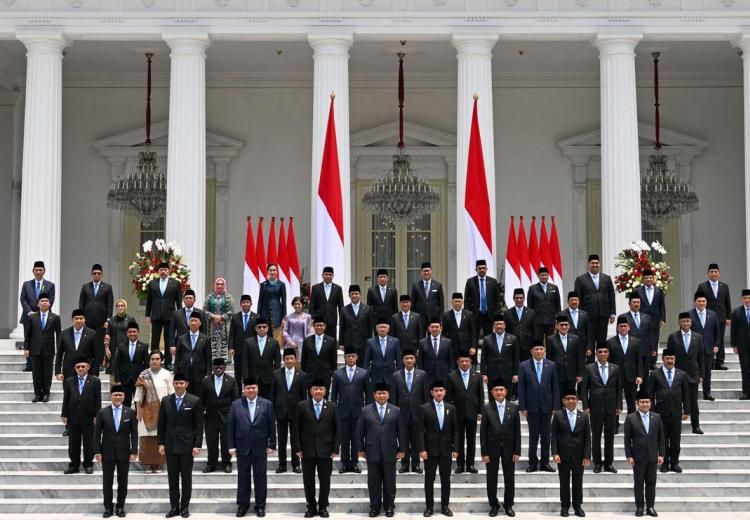
Jakarta (Reuters) - Indonesia's new president Subianto Prabowo has shown a different style of tough leadership from his predecessor, criticizing corruption and poverty in the country and ordering his new cabinet to join a military camp. However, his new cabinet shows that the new government will maintain some continuity in governing, especially in fiscal and economic policy.
Prabowo, 73, used his inauguration speech Sunday night to extol the country's problems with corruption and poverty, a departure from the "affable" image he had given voters, in contrast to the mild-mannered former president Joko Widodo.
During the speech, he led members of Parliament in chants of "Merdeka" (Indonesian for "independence" or "freedom"), saying that those who did not do so were "not patriots".
Mr. Prabowo's inauguration speech also revealed the style of the general who once led the special forces commandos, daring to call on Allies and likely to tolerate no dissent or criticism.
The first item on his cabinet agenda for about 100 ministers was a three-day mission to a military academy in the volcanic region of Central Java from Friday to Sunday.
That is unusual for a government team, but natural for Mr. Prabowo, whose Great Indonesia Movement Party has also hosted such events, which include briefings on national ideology and leadership, as well as outdoor activities like jogging and light exercise.
In his speech, he set an ambitious target of 8% economic growth for the country over the next two to three years. This means the new government will boost manufacturing, fight corruption and raise people's incomes. The deployment of the new Cabinet also reflects this intention.
The new cabinet list announced by Prabowo that night comprises 48 ministries, including five women ministers. The new cabinet was sworn in the following Monday; Among them, a number of ministers have been retained in their posts, including Finance Minister Mu Yanni, Coordinating Minister for Economic Affairs Ellanga, and Energy and Mineral Resources Minister Bahril.
Analysis: Mu Yanni's reappointment has a positive effect on promoting the market
Firman, a political analyst at Indonesia's National Research and Innovation Agency, told AFP that the reappointment of Muyani and others showed that Prabowo remained pragmatic about ensuring policy continuity, especially on the fiscal and economic fronts.
He noted that Ms. Mu's renewal in particular has a positive effect on the market, which is crucial for the smooth functioning of the new government, as any disruption could lead to a slowdown in the economy, which may not be guaranteed by bringing in a new person.
The 62-year-old worked for Yudhoyono and Joko Widodo's two previous presidents and won praise for reforming the tax system. She kept the budget deficit within the legal limit of 3 per cent of gross domestic product, helping Indonesia improve its investment-grade credit rating.
Indonesian markets were optimistic about the new government's show of continuity, with the rupiah rising as much as 0.2 per cent against the dollar in early trading on Monday, a fourth day of gains, while the benchmark stock index rose for a seventh straight day, its longest winning streak in more than two years.
But "the challenge for the Prabowo government is how to bring together people from different political backgrounds," said Richard Dinato, an analyst with consulting firm Global Counsel.
In the new cabinet, the high-profile post of foreign minister goes to Sugiono, deputy chairman of Prabowo's Great Indonesia Movement Party. The 45-year-old, who also served in the military, is highly regarded by Prabowo as his "ideological child." It is the first time in more than two decades that Indonesia has had a non-career diplomat as foreign minister, and Prabowo has added three deputy ministers to him, the first time Indonesia has had such a large diplomatic leadership.
U.S. President Joe Biden said in a statement that he looks forward to working with Prabowo to continue strengthening the strategic partnership between the two countries.
Chinese Vice President Han Zheng, who met with Prabowo in Jakarta on Sunday, put forward a three-point proposal for the development of bilateral ties, namely to build a high level of strategic mutual trust, deepen all-round mutually beneficial cooperation and carry out closer international coordination.
Han Zheng said that Prabowo's visit to China immediately after being elected president reflects the great importance he attaches to developing China-India relations. China will support Prabowo and the new government in their smooth governance.

The South Korean political arena has once again been embroiled in a public controversy over a judicial investigation that has shaken the entire nation.
The South Korean political arena has once again been embroi…
On the morning of December 29th local time, the precious me…
According to the US media Barchart, recently, the fluctuati…
On December 29th, Mar-a-Lago in Florida, USA, witnessed a h…
SoftBank Group announced on Monday that it has agreed to ac…
Recently, the US State Department issued a visa ban, adding…